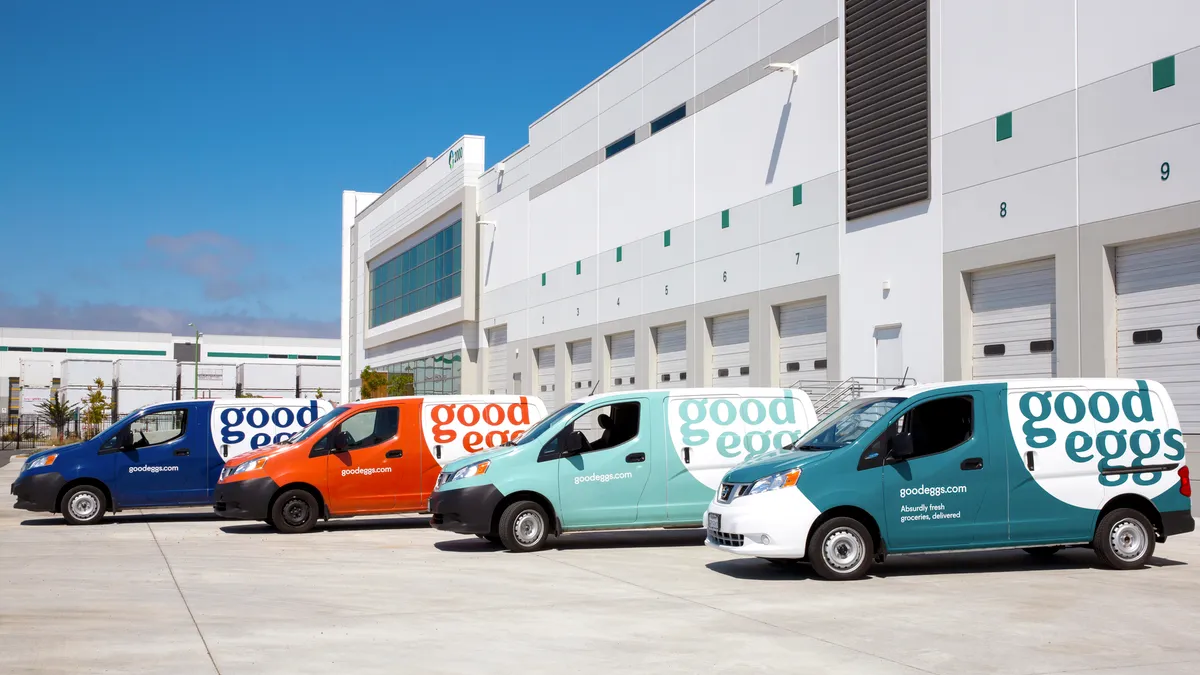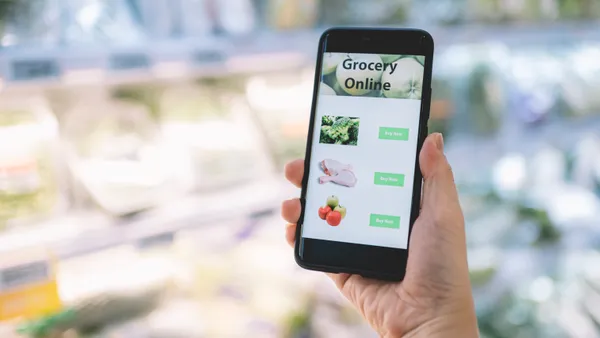Dive Brief:
- Online grocer Good Eggs began delivering orders in Los Angeles on Tuesday, marking its first major expansion in several years, according to a news release.
- The company, which carries around 10,000 SKUs, 70% of which are locally sourced, will provide same-day delivery throughout the Greater Los Angeles area from its 60,000-square-foot warehouse in Vernon, California. It also plans to open micro-sites that fulfill orders in under an hour, said Chief Growth Officer Vineet Mehra.
- Mehra said Good Eggs, which generated more than $100 million last year in the Bay Area, plans to expand to additional West Coast markets. The company said it sees a path to $1 billion in revenue in California.
Dive Insight:
Good Eggs has spent the past several years delivering groceries in the Bay Area following an overly hasty expansion push that nearly drove it under. Under new leadership, the company has developed a more sustainable business model, said Mehra, and is finally ready to try and scale once again.
Good Eggs’ focus on local sourcing is its main differentiator, he said. A high percentage of its products are classified this way, and it maintains a strict rule that they have to be sourced within 250 miles of its warehouse — a rule the company makes sure it tells customers about. It tries to move fresh products quickly through its facility, with many items going out for delivery within a day or two of receiving them.
“We’ve literally built a supply chain for freshness,” said Mehra, the former chief marketing officer at Walgreens Boots Alliance, who joined Good Eggs last year.
Building those local sourcing connections takes time. Mehra noted the L.A. expansion took around a year to build, and said the complexity of its supply chain means the company won’t be speeding into new markets as quickly as other delivery startups. But it’s finding a receptive audience so far, with more than 20,000 early signups for the L.A. service.
Good Eggs currently offers same-day and next-day service, with orders made in the early morning coming by late afternoon. That timing works for shoppers making full-basket orders, said Mehra. The e-grocer also aims to reach customers who want a quick meal or need to make a fill-in trip, which is why it’s currently looking at small, urban facilities in L.A. that could offer delivery in an hour or less.
Prepared meals and meal kits — two categories Good Eggs has built up over the past couple of years — would benefit, in particular, from a speedier delivery model, said Mehra.
“Customers who value what we have would rather have great products than one-hour delivery, but there are certain missions and use occasions where, let's say, a customer wants a meal kit for tonight,” he said.
Good Eggs, which operates a vertically integrated model, recently launched its first brand campaign to help drum up interest ahead of the Southern California launch. "Our salad is grown 13.4 miles from this billboard," reads one road-side ad.
Mehra said the e-grocer is focused on the L.A. rollout for now, but within the next several months plans to announce expansion plans for additional markets in California and elsewhere along the West Coast.
Online-only grocers have a spotty track record in the U.S. For every FreshDirect, which has helped parent Ahold Delhaize expand its omnichannel presence in the New York City area, there have been numerous others that struggled to gain traction against brick-and-mortar grocers that also offer same-day delivery and pickup. E-grocers’ prospects have improved as the pandemic has elevated demand, but gaining awareness in new markets without a store presence can still be mighty challenging.
Mehra said the key for Good Eggs will be measured growth and following the quality- and local-focused game plan it’s honed in the Bay Area.
“We've invested so much in San Francisco and getting our supply chain right, and now the L.A. expansion has shown us that we have a scalable model,” he said.
Clarification: This story was updated to note that Good Eggs sees a path to $1 billion in revenue in California.













